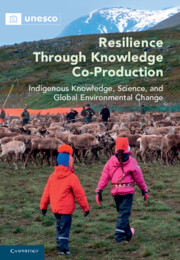 Resilience through Knowledge Co-Production
Resilience through Knowledge Co-Production from Part III - Global Change and Indigenous Responses
Published online by Cambridge University Press: 02 June 2022
Assessing potential drivers of and linkages between sea ice retreat or thinning across Arctic Russia and maintenance of the ancient and unique social-ecological systems of the Indigenous reindeer-herding Nenets is a pressing task. Sea ice loss is accelerating in the Barents and Kara Seas in the northwestern region of Arctic Russia. Warming summer air temperatures in recent decades have been linked to more frequent and sustained summer high-pressure systems over West Siberia but not to sea ice retreat. At the same time, autumn/winter rain-on-snow events across the region have become more frequent and intense. Two major rain-on-snow events during November 2006 and 2013 led to massive winter reindeer mortality episodes on Yamal Peninsula, where tundra nomadism remains a vitally important livelihood activity for the indigenous Nenets.
Here we review evidence for autumn atmospheric warming and precipitation increases over Arctic coastal lands in proximity to Barents and Kara sea ice loss. Realizing mutual coexistence of tundra nomadism within the Arctic’s largest natural gas complex under a warming climate will require ready access to and careful interpretation of real-time meteorological and sea-ice data and modelling, as well as meaningful consultation with local communities.
To save this book to your Kindle, first ensure no-reply@cambridge.org is added to your Approved Personal Document E-mail List under your Personal Document Settings on the Manage Your Content and Devices page of your Amazon account. Then enter the ‘name’ part of your Kindle email address below. Find out more about saving to your Kindle.
Note you can select to save to either the @free.kindle.com or @kindle.com variations. ‘@free.kindle.com’ emails are free but can only be saved to your device when it is connected to wi-fi. ‘@kindle.com’ emails can be delivered even when you are not connected to wi-fi, but note that service fees apply.
Find out more about the Kindle Personal Document Service.
To save content items to your account, please confirm that you agree to abide by our usage policies. If this is the first time you use this feature, you will be asked to authorise Cambridge Core to connect with your account. Find out more about saving content to Dropbox.
To save content items to your account, please confirm that you agree to abide by our usage policies. If this is the first time you use this feature, you will be asked to authorise Cambridge Core to connect with your account. Find out more about saving content to Google Drive.